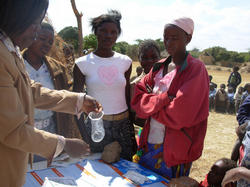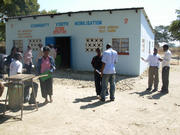 |
CHIP HIV/AIDS Activities in Rural Areas
There are six main areas of work under the Community HIV/AIDS Intervention Programme (CHIP). These are as follows; 1) Community Youth Gatherings: - The strategic aim of this is to ensure that regular lessons on HIV/AIDS are conducted to rural community youth on various topics by CHIP volunteers. 2) Door -to- Door Campaigns: - In this strategic aim, volunteers with support from community committees and CYM staff conduct door to door campaigns in the communities as a means to provide an opportunity to everyone to listen to HIV/AIDS messages. The campaigns targets the grandmothers and other guardians looking after orphans and vulnerable children to promote good health living. 3) Community events: - The strategic aim of this is to hold workshops and meetings at community level with children directly affected and infected with HIV/AIDS discussing very important and urgent issues affecting them. 4) Health Days: - Community Health Days are held at selected times during the year to give members of the community a day to reflect on the well being of their health. Issues that volunteers cannot otherwise handle effectively in communities are referred to the experts from various partner organisations working with CYM both at district and community levels. 5) Community Youth Centers: - This strategic aim establishes Youth Centers across the rural communities to provide the youth and women and other community members access to youth friendly and sexual reproductive health materials designed to increase knowledge and awareness of HIV/AIDS in their communities. 6) Peer Outreach: - This strategic aim enables volunteers to reach out to the remotest places and all areas where people are found within the project zone, e.g. farms, markets, rural night spots, along the highway, hammer mills, fishing areas, etc |
Community HIV/AIDS Intervention Programme
CHIP is a multisectoral HIV/AIDS initiative in rural communities of Central Province in Zambia which is led by Community Youth Mobilisation (CYM). CHIP brings together the expertise and geographical coverage of four international charities and local non-governmental organisations (NGO) consortium partners through the District AIDS Task Force (DATF) at district level, and Provincial AIDS Task Force (PATF) at provincial level. Through this strong alliance, CHIP is scaling up on-going service delivery for vulnerable communities in rural areas. CHIP helps to fortify neglected communities made vulnerable by HIV/AIDS by focusing on three main strategic objectives; To increase Knowledge and Awareness of HIV/AIDS/STI and related issues in rural communities, especially among the youth: To reduce risky behaviours among the youth that make them vulnerable to HIV/AIDS; and Mitigate the HIV/AIDS epidemic through preventative education for the rural youth.
CHIP strategic partners have a long history of working with local communities in the strategic objective service areas, all across Zambia. Acting as a catalyst, CHIP mobilises rural communities and helps them address their needs by providing strong technical and capacity building support. The CHIP approach to mitigating the impact of HIV/AIDS in rural areas is dependent on the commitment of trained Community Based Volunteers (CBV). These volunteers reach out to thousands of rural youth with different programme activities and link them education, health, and protection services; establish PLWHA support groups and provide care; facilitate youth groups; establish community committees and create community coalitions that act as a community forum on HIV/AIDS. To strengthen the quality of interventions, the proposed project will employ a “Ball Game Plan” strategy which enables community members themselves to preside over the HIV/AIDS crisis within their communities. The strategy allows them to first identify the factors contributing to the HIV/AIDS crisis and then using existing community structures, design strategies to overcome them. By the end of the life of project, CHIP aims to have improved Zambia’s quality of life by strengthening rural communities’ institutional capacity to respond to HIV/AIDS in an effective way. |
CHIP Strategy and Approach
The programme models that CHIP employs are based on global practices and lessons learned from the implementation experience in Central Province of Zambia. In addition to focusing on three strategic objectives, CHIP follows the three guiding principles that address the magnitude, urgency and complex of the HIV/AIDS crisis in rural Zambia; - The need to develop a sustainable, rural community-led response to HIV/AIDS crisis.
- The need to open up rural areas for HIV/AIDS activities and bring multisectoral interventions to address the challenge.
- The need to work with many organisations/institutions/partners in a coordinated manner in order to achieve the compounding effects needed to respond on scale equal to the magnitude of the crisis.
- Community-Led Response: - There are no or little HIV/AIDS intervention programmes in rural Zambia. Meanwhile, there are over one million PLWHA in Zambia and approximately 800,000 orphans. In Zambia, the rural areas lack the formal healthcare and support services to adequately cope with the massive number of individuals in rural areas who require assistance. Due to poor availability and access to services, the front-line response to HIV/AIDS must be rooted in rural communities so that they can care for their members.
CHIP is mobilising community members into ‘CYM Community Committees’ (CCC) as a primary mechanism for providing care and support to rural youth, OVC, PLWHA and vulnerable households. CCC’s are representatives of a broad spectrum of community stakeholders. CHIP acts as the facilitating agent, building the capacity of CCCs to effectively carry out their agenda and to grow in organisational maturity. CHIP is mobilising communities in other provinces and sees this as integral to the long-term national response to HIV/AIDS in rural areas. - Multisectoral Interventions: In Zambia, HIV/AIDS is not a health issue alone. The impact is compounded by overwhelming poverty, low levels of agricultural production etc. As a result, households have difficulty recovering from the impact of HIV/AIDS and their welfare becomes increasingly insecure.
For program interventions to be effective, HIV/AIDS must be analysed within the context of widespread poverty, food insecurity, and limited livelihood options. CHIP will address the needs of PLWHA, by visiting and caring for the ill in their homes. Through regular monitoring and our established referral network, CHIP will bring healthcare into the home and linking PLWHA to testing and treatment services. CHIP is addressing the issues facing the rural youth, one of the most vulnerable demographics to HIV infection, by providing regular life skills education to help youth make healthy choices and by providing livelihood training and options. - Public-Private Partnerships: CHIP cannot mitigate the impact of HIV/AIDS in rural Zambia, single-handedly. CHIP works closely with the government of Zambia through the District Health Management Teams (DHMT), private donors and other implementing organisations (e.g. Kara Counseling, NZP+, Drug Enforcement Commission, SFH, Africare, ZPCT, and other members of the district and provincial task forces) in order to capitalize on all available resources and to coordinate efforts across the country. By working through CHIP, private donations are able to achieve lasting impact on a large-scale. For example, private donations have helped in building infrastructure specifically for HIV/AIDS in all rural communities where CYM has a presence.
The activities, strategies and approach of the proposed project are all in line with national HIV/AIDS guidelines – 2005, and are in conformity with the overall objective of ‘Youth & HIV/AIDS’ in the National Youth Policy – 2006 |
Do you Want More Information about CHIP
Do you have some rural communities in mind which you feel can benefit from our Community HIV/AIDS Intervention Programme? Its simple! Just write to us and answer the following questions; -Where is the community located? - What is the estimated population of the community you want to benefit from CHIP? - What type of HIV/AIDS interventions are currently taking place in the community? Send an e-mail: cym@zamtel.zm
Rural Youth Empowerment
The major target group of the CHIP are the youth living in neglected and disdvantaged rural communities. CHIP empowers the youth with knowledge and life skills so they can take a leading role in the fight against HIV/AIDS in their communities. Community Youth Centers have been established across rural communities south of Kabwe district including Chibombo and Kapiri districts. Youth Centers act as a nerve center where all CHIP HIV/AIDS activities are managed from. One of CYM strategies for programme sustainability is the building of infrastracture specifically for HIV/AIDS intervention in rural areas. Rural Youth working on the CYM programme manage their activities from these centers. |

Example of a Rural Community Youth Center
A number of activities take place at the Community Youth Center. Other that the six CHIP activities, volunteers conduct peer counseling, sports activities, community clubs such as drama, cultural dance group, etc. The centers also manage activities for People Living With HIV/AIDS (PLWHA), Orphans and nutrition education for mothers in rural communities. The Building is complete with a Resource Center, staff room, Counseling Room and HIV Testing Room, all built by the community members themselves. The lack of infrastructure in rural communities where the fight against the AIDS epidemic can be managed from, is a challenge yet to be overcome by many organisations in Zambia. CYM is leading the way by mobilising rural people to put up infrastructure for themselves where the HIV/AIDS crisis in their communities can be managed from. The experience has shown that this strategy can actually change the future course of the epidemic in rural areas.
|


